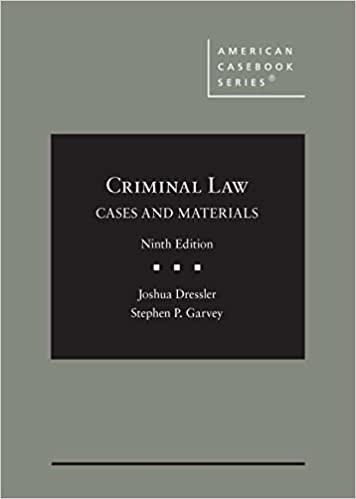Question
1. Statutes that permit states to obtain jurisdiction over an out of state defendant who has minimum contacts with the state are called: 2. The
1. Statutes that permit states to obtain jurisdiction over an out of state defendant who has minimum contacts with the state are called:
2. The law establishing the period during which a plaintiff must commence an action or bring a lawsuit against a defendant, or it is barred is:
3. The document served on a defendant and filed with the court to commence an action and initiate the lawsuit is:
4. Administrative agencies are part of which branch of the government:
5. In looking up federal administrative rules where would you find them:
6. The burden of proof in a civil case is? 1)__________ and in a criminal case the burden of proof is 2) __________.
7. The Constitutional provision that a person cannot be tried twice for the same offense is:
8. Under the Fourth Amendment to the Constitution evidence obtained illegally will not be admitted under the__________rule.
9. Minnesota classifies crimes in three categories based on possible penalties. What are the three classifications of crimes?
A.
B.
C.
10. In capital cases, when one is charged with first degree murder a formal charge must be brought by the:
11. List four exceptions to the "exclusionary rule" when a warrant need not be obtained:
1.
2.
3.
4.
12. State the three branches of the federal government:
1.
2.
3.
13. When a court has the power to hear a case it is said they have__________over the matter.
14. The theory of following prior court decisions or rulings is known as:
15. The process of selecting a jury, from the French "to see to say" is called:
16. Statements made by a client to an attorney under the attorney-client relationship must be held in strict:
17. Identify five procedural protections under the Sixth Amendment:
1.
2.
3.
4.
5.
18. The concept of a strong central government and individual state governments is:
19. The federal trial court is called:
20. A law established by a state or federal legislative branch is called a:
21. Before the U.S. Supreme Court will accept a case for hearing they must issue a writ of:
22. Oral testimony given by a party or witness prior to trial and under oath is called a:
23. What branch of the government creates the law:
24. An appellate court that determines there were no errors by the lower court will the decision. If they feel harmful error occurred, they will__________the decision, and if they feel additional information is needed to correct an error they will send it back to the lower court which is called:
25. List four of the six methods of discovery in a civil case:
1.
2.
3.
4.
26. What is the ethical duty of a prosecutor?
27. Jury verdicts in a criminal case must be?
Step by Step Solution
There are 3 Steps involved in it
Step: 1

Get Instant Access to Expert-Tailored Solutions
See step-by-step solutions with expert insights and AI powered tools for academic success
Step: 2

Step: 3

Ace Your Homework with AI
Get the answers you need in no time with our AI-driven, step-by-step assistance
Get Started


